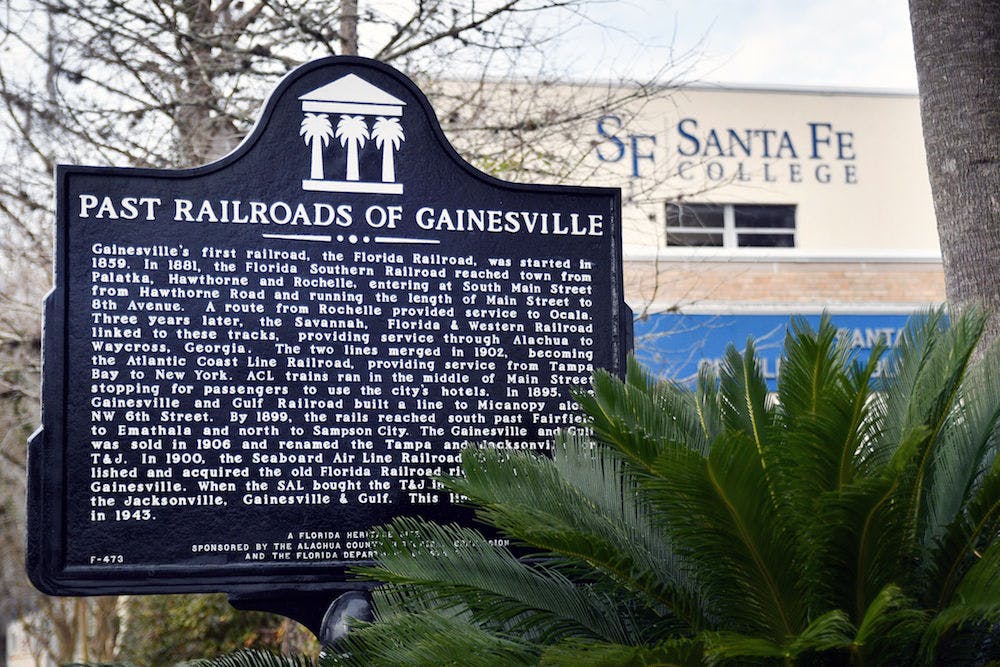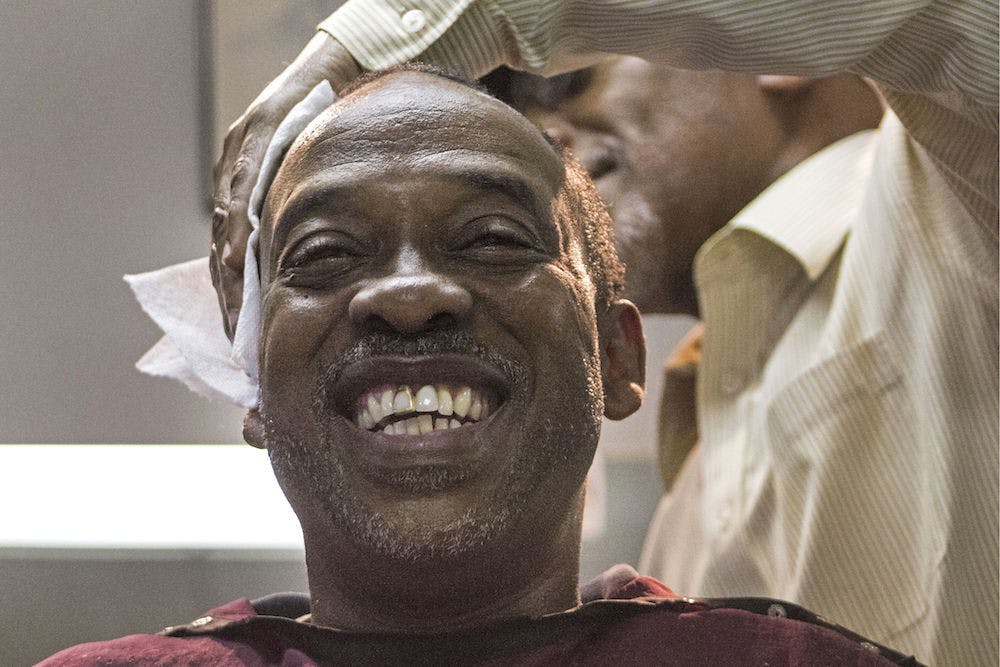Edward Young’s razor hummed as he shaved around a man’s ears and began to share stories about his 64 years on Fifth Avenue.
He recounted eating at his parents’ soul food restaurant called Mom’s Kitchen and shining shoes in the neighborhood all while his hand steadily transformed one of his regulars’ bushy beard into a well-groomed mustache.
Posters with Bible verses that ask customers to be thankful hang on the walls. Out the windows, a fence divides an empty lot with bright green grass from the rest of Fifth Avenue and its pink, decades-old houses.
Pleasant Street Historic District was designated as a U.S. historic district by the National Register of Historic Places on April 20, 1989, and was the first African American neighborhood added to the national registry in Florida, said Kathleen Pagan, the senior planner and staff liaison at Alachua County Historical Commission.
Historic districts are neighborhoods that contain several buildings with a unique historic value. There are four other historic districts in Gainesville, including Northeast Residential, Southeast Residential, University Heights - North and University Heights - South.
The neighborhood lies in the heart of Main Street, Northwest Eighth Avenue, Northwest Second Avenue and Northwest Sixth Street. Red-bricked churches and small wooden-framed houses more than 100 years old are some of the 271 buildings in the district, according to the National Park Service.
Two hundred fifty-nine of those buildings were marked historic on the National Register in 1989, but in the first 14 years, 40 of those buildings were demolished and several more have followed in that path since.
Suzanne Rumsey, 51, who moved to the neighborhood in 2013, said she is worried that soon less than 60 percent of the original buildings will be left standing, causing the neighborhood to lose its historical designation.
Historically protected buildings are being bought by private and out-of-state parties and are ignored until they’re deemed a safety hazard by the city and must be demolished, Rumsey said.
In December, Rumsey and nine other neighborhood residents appealed the city’s decision to approve a building development they felt did not meet the criteria to be approved.
Blackwater Investments, LLC, a development firm based in Birmingham, Alabama, submitted a plan for Pleasant Street Luxury Condos, which will be built at 422 NW Third Ave., which includes three buildings with two units in each.
Neighbors were concerned the plan would cause overcrowded parking because it does not have enough land for the project. The city sided with Blackwater Investments, LLC.
“Unfortunately, our city has no way to protect, even though it’s nationally registered, developers have ways of wiggling their ways in,” Rumsey said.
Young, the barber, has worked at Clean Cut Barber Shop, at 430 NW Fifth Ave., since 1993. He has groomed UF football coaches, governors and relatives. He feels like no one is interested in preserving the town.
“If this wasn’t historically protected, I wouldn’t be here today in this shop,” Young said. “Them houses wouldn’t be protected. This community, the streets, the home, the businesses, which some are already destroyed and gone.”
Properties in the area meant to preserve the district’s history and culture have instead been used by Gainesville’s educational institutions and their students, Young said.
A historic train station at 401 NW Sixth St. was supposed to be a cultural museum to display artifacts and historical photos of the area. But it became one of the buildings for the Santa Fe College Blount Center, at its downtown campus, and the museum was put in the historical home of A. Quinn Jones.
“We’re proud of the students,” Young said. “But they’re depriving the black community out of entrepreneurship.”

The historic Atlantic Coast Line Railroad Depot has become part of the Santa Fe College downtown campus.
Young said the people who are supposed to be representing the area, such as District 1 Commissioner Gigi Simmons, are afraid to speak out.
Simmons could not be reached for comment.
“Literally, they have stolen from this community. They need to give back what they have taken,” Young said. “We gonna get real commissioners. So far, them folks up there have done a bum job.”
City Commissioner David Arreola said the commission recently decided how to allocate the efforts of Community Redevelopment Agency, which helps underserved regions attract private investment funds, to different areas of the city.
“We want to see CRA money go to Pleasant Street for sure,” he said. “Most importantly, we want to make sure we are following the advice of our advisory board since they are made up of residents from the area.”
The houses next door to Rumsey’s are owned by a private buyer who lives in California. Rumsey said the owner predominantly rents the houses to students in the area. This cuts into the tight-knit relationship neighbors have with each other as new people move in and out constantly, she said.
Though Rumsey said she hasn’t lived in the area for long, she wants to see her community protected.
“I don’t think we have anyone watching out for us from the city, and they should be fighting tooth and nail to save this area,” Rumsey said.
Dotty Faibisy, chair of the Pleasant Street Neighborhood Association and a 20-year Pleasant Street resident, thinks hiring a historic preservationist, a city employee who manages the preservation of historic landmarks, could help ensure the neighborhood stays above the crucial 60 percent to maintain its designation.
The job position exists but is vacant. Mayor Lauren Poe said the city planning board does have a person dedicated to focusing on historic preservation in the meantime.
While Faibisy said she doesn’t like to think negatively, she is concerned about how the city is taking care of the neighborhood.
“I’m one of the people who tend to the neighborhood, and I do what I can to take care of it,” she said.
“The commission has been consistently invested in the neighborhood, from building homes to revitalizing business,” Poe said. “We are investing money in infrastructure to bring it into modern standards, and we are investing to ensure businesses continue to grow there.”
Young put down his electric clippers and wiped sweet-smelling aftershave onto the face of his client.
He greeted the next guest, and without skipping a beat, asked him what haircut he’d like. With a sigh, Young gave his last request for the future of Pleasant Street.
“Respect the community and people who were born and raised here,” Young said. “The natives; the true natives of Fifth Avenue.”
Tien Le contributed reporting for this story.
Vincent Tate, 51, receives a haircut Tuesday from Edward Young, 64, at the Clean Cut Barber Shop on Northwest Fifth Avenue. Tate moved from Alabama to Gainesville for a fresh start, and he has worked for the Alachua County School Board for 25 years.






